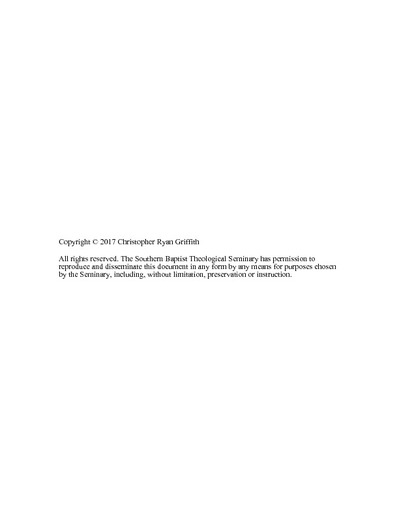| dc.contributor.advisor | Haykin, Michael A. G. | |
| dc.contributor.author | Griffith, Christopher Ryan | |
| dc.date.accessioned | 2019-06-05T18:31:20Z | |
| dc.date.available | 2019-06-05T18:31:20Z | |
| dc.date.issued | 2017-12-12 | |
| dc.identifier.uri | http://hdl.handle.net/10392/5834 | |
| dc.description.abstract | In the preface to the 1749 publication of The Life of David Brainerd, Jonathan Edwards (1703–1758) explains the benefit of recounting exemplary lives: “There are two ways of representing and recommending true religion and virtue to the world, which God hath made use of: the one is by doctrine and precept; the other is by instance and example.” Edwards and his heirs made strategic use of the eighteenth-century convention of biography as a vehicle for teaching Christian doctrine and piety. This dissertation argues that John Ryland, Jr. (1753–1825) consciously adopted Edwards’s aims in his biography of Baptist theologian, Andrew Fuller (1754–1815), “with the hope of promoting pure and undefiled religion, founded on truly scriptural and evangelical principles.” The introductory chapter highlights the significance of John Ryland, Jr., particularly as it relates to the legacy of Jonathan Edwards among British Particular Baptists. Chapter 2 describes the life and spiritual formation of John Ryland, Jr., tracing Ryland’s theological influences and demonstrating how his early life and spiritual formation shaped his writing and ministry. The third chapter surveys Ryland’s extensive ministry, emphasizing his ecumenical friendships, his pastoral ministry in Northampton and Bristol, his efforts in training pastors at Bristol Academy, his advocacy for the Baptist Mission Society, and his participation in several important theological controversies. Chapter 4 describes the development of eighteenth-century biography, particularly focusing on the adaptation of the genre by Jonathan Edwards and his New Divinity and English Baptist heirs. Chapters 5 and 6 build on the examination of Ryland’s life and the development of Edwardsean evangelical biography, by arguing that Ryland deliberately shaped his memoir of Fuller on Edward’s Life of David Brainerd. Like Edwards’s portrayal of Brainerd, Ryland sought to use Fuller’s life to illustrate true religious affection. Chapter 6 compares the biographies of Ryland and J. W. Morris (1763–1836) with special attention to their selectivity and theological emphases. A final chapter summarizes the ways in which John Ryland’s biography adopted Edwards’s aims and emphasized Fuller’s Edwardseanism, and concludes by arguing for the ongoing significance of John Ryland’s legacy. | en_US |
| dc.subject.lcsh | Ryland, John, 1753-1825 | en_US |
| dc.subject.lcsh | Edwards, Jonathan, 1703-1758 | en_US |
| dc.subject.lcsh | Fuller, Andrew, 1754-1815 | en_US |
| dc.subject.lcsh | Reformed Baptists--History | en_US |
| dc.title | "Promoting Pure and Undefiled Religion": John Ryland, Jr. (1753–1825) and Edwardsean Evangelical Biography | en_US |
| dc.type | Electronic dissertation | en_US |
| dc.type | Text | en_US |
| dc.contributor.committee | Whitney, Donald S. | |
| dc.contributor.committee | Wills, Gregory A. | |
| dc.type.qualificationname | Ph.D. | en_US |
| dc.publisher.institution | Southern Baptist Theological Seminary | en_US |
| dc.publisher.department | School of Theology | |

